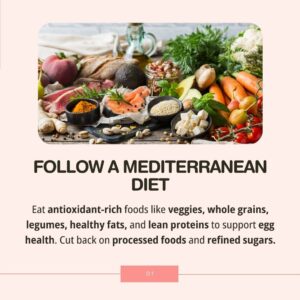IVF Diet: The Best Foods to Improve IVF Success
If you’re preparing for in vitro fertilisation (IVF), your diet can be crucial in optimising your fertility and improving your chances of success. While IVF is a medical procedure, nutrition influences egg quality, implantation, and overall reproductive health.
Eating the right foods can help balance hormones, reduce inflammation, and create the best environment for a successful pregnancy.
A recent systematic review and meta-analysis explored how preconception dietary patterns influence pregnancy outcomes in couples undergoing Assisted Reproductive Technologies (ART). Analysing 13 studies with 3,638 participants, the research found that adherence to specific diets—especially the Mediterranean diet and a novel fertility diet—was associated with a higher likelihood of clinical pregnancy and live birth. Notably, the Mediterranean diet was linked to a 25% increase in live birth rates (Kellow et al., 2022).
Another systematic review and meta-analysis explored whether the Mediterranean diet can enhance fertility outcomes in men and women struggling with infertility. Analysing data from 11 studies involving over 14,000 participants, researchers found that greater adherence to the Mediterranean diet was linked to improved fertility markers, including higher pregnancy rates, increased live births, and enhanced sperm concentration and count (Muffone et al., 2023).
This blog breaks down the IVF diet into five key steps, providing practical, research-backed strategies to support your fertility.
1. Follow a Mediterranean-style eating Pattern

The Mediterranean diet is a nutrient-dense eating pattern rich in antioxidants, healthy fats, and anti-inflammatory foods. It prioritises:
✅ Plenty of fresh vegetables and fruits
✅ Whole grains like quinoa, oats, and brown rice
✅ Legumes such as chickpeas, lentils, and beans
✅ Healthy fats from extra virgin olive oil, nuts, and seeds
✅ Lean proteins, especially fatty fish
Key Tips: Reduce processed foods, refined sugars, and excessive red meat, which can contribute to inflammation and negatively impact fertility. Find out which seven less fertile foods to avoid in our previous blog here.
2. Prioritise Whole Grains for Embryo Implantation

Boosting IVF success may start with a simple dietary change—adding more whole grains. Whole grains are rich in fibre, B vitamins, iron, zinc, and antioxidants—all essential for hormonal balance and a healthy reproductive system. Emerging research suggests that higher preconception intake of whole grains may improve embryo implantation and overall IVF success rates.
A recent prospective cohort study found that women who consumed higher amounts of whole grains before undergoing IVF had significantly better outcomes, including a higher probability of live birth and implantation. Those in the highest quartile of whole grain intake had a 53% live birth rate, compared to 35% in the lowest quartile. The study also revealed that an additional serving of whole grains was linked to increased endometrial thickness, which is crucial for embryo implantation (Gaskins et al., 2016).
Best Whole Grains for IVF Success:
✅ Quinoa
✅ Rolled Oats
✅ Brown rice
✅ Buckwheat
✅ Amaranth
✅ Millet
Key Tips: Aim for 3-6 servings of whole grains daily to stabilise blood sugar and hormonal balance. Choose gluten-free grains if you’ve been diagnosed with coeliac.
3. Increase Omega-3 Intake for Egg Quality

A systematic review explores the impact of dietary omega-3 polyunsaturated fatty acids (PUFAs) on oocyte and embryo quality in women undergoing IVF and ICSI. Based on five studies, the review found that increased omega-3 intake was linked to better embryo development, including improved shape, structure, and growth timing, leading to higher success rates in fertility treatments (Abodia et al., 2024).
Best Omega-3 Rich Foods:
✅ Fatty fish like salmon, sardines, herring, and mackerel
✅ Chia seeds and flaxseeds
✅ Walnuts
Key Tips: Prioritise wild-caught, low-mercury fish while minimising toxin exposure. While plant-based sources like flaxseeds, chia seeds, and walnuts contain omega-3s (ALA), they do not efficiently convert the human body to more beneficial forms (EPA and DHA).
For vegetarians, algae-based omega-3 supplements are a great alternative to ensure adequate intake of these essential fatty acids.
Bottom Line
- Follow a Mediterranean-style eating pattern – Rich in antioxidants, healthy fats, and anti-inflammatory foods to improve fertility outcomes.
- Prioritise whole grains – Supports hormonal balance and enhances embryo implantation for higher IVF success rates.
- Boost omega-3 intake – Essential for egg quality and embryo development, supporting a successful pregnancy.
